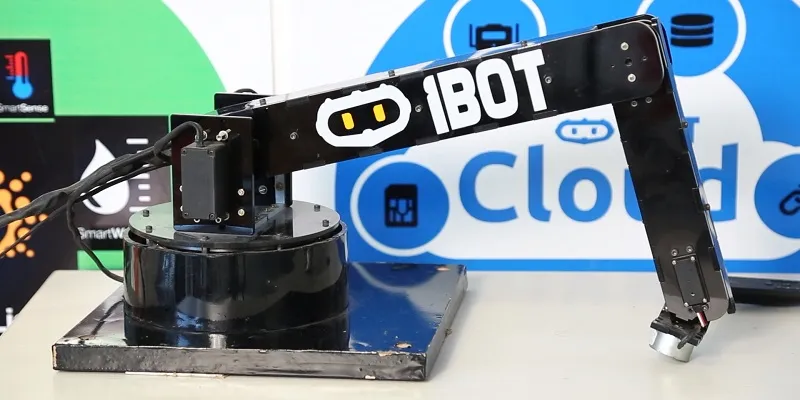
Qualcomm
View Brand PublisheriBot goes after the holy grail of IoT, ‘smartens’ products into connected devices
IoT for everyone—if that sounds futuristic, or unrealistic, then it’s time for a reality check, because Hyderabad-based iBot Inc. is doing just that—democratising the Internet of Things (IoT) to make it something everybody can use. Theirs is an IoT platform that allows people and businesses to ‘talk’ to machines, do business with them and even get them to generate business intelligence.
Imagine a single board computer for IoT that will allow for plug and play experiences around IoT in a very self-driven manner. A user will be able to plug in any kind of sensor or actuator and use on-board radio systems to connect to the cloud and experience the power of IoT in a true do-it-yourself style (DIY). iBot is working on this as a solution to a problem of IoT being too abstract to touch and feel or even understand for the average consumer.
Serial entrepreneur 43-year-old Ravi Subramanyam’s second venture, iBot is the single source for IoT technology for many connected products like traffic lights, street lights, air conditioners, dishwashers, and vending machines. They are now working on a single board computer called the iBot Computer. With their technology stack, they connect the client's machines all the way to the cloud. On one side, they have OEMs and on the other they are working with cloud platforms like Azure, IBM, AWS as well as other IoT platforms that customers choose to deploy.

A Microsoft Accelerator platform company, iBot was founded in 2012 and is working with 20 OEMs and large manufacturers in India, USA and South America and is present across six verticals: vending machines, commercial refrigeration, energy equipment, appliance manufacturers, automotive transportation and food and agriculture. A part of their work also includes tracking people working with large infrastructure based companies like mining, where it is of utmost importance to keep track of people movements.
Not many people know that it is possible to use 4G networks to a very low bandwidth of 2G simultaneously within the same network. So a consumer who has a telecom provider such as Airtel, Vodafone, Jio can enjoy multimedia content as well as throttle it down to the same network with 100 kbps throughput for all IoT connectivity with technologies like cat M1.
Ravi elaborates, "For us, connectivity is a major part of our business. The bridge between electronics, machines and cloud is based on effective cellular communication. So, for existing telcos to ramp up and cater to two different markets using same technology is now possible. Also, Qualcomm has a lot of IP around this area like cat M1, cat 2 and cat 4. With this background, we were in talks with them for a partnership as we are also a part of the Nasscom CoE – IoT, and so is Qualcomm. We also keep getting requests from educational institutions for support. Typically the requests are around teaching IoT to students and building content around IoT. So we went to Qualcomm with a proposal to use their narrow-band technology. Incidentally, this helped align our ideas with the larger objectives of Nasscom as well, that of spreading awareness of IoT."
While making a presentation to Qualcomm, iBot discovered the Qualcomm Design in India Challenge 2017 and present their idea to the stakeholders at Qualcomm. It is now one of eight shortlisted companies in Cycle 1 of the challenge.
"On our part, we went to Qualcomm with a very tangible idea of building a single board computer – the iBot Computer. The computer would be a rapid prototyping platform not only for large enterprises but one that startups, small businesses, academia would also be able to use," mentions Ravi. Equipped with an iBot Computer, a user will be able to address the following scenarios, such as:
Academia: Students often end up spending money to buy off-the-shelf and hardwired, hard-coded electronics kits and submit these kits as their own projects to qualify for their Bachelors or Master’s degree. This creates copy/paste engineers and seriously hinders skill development.
The iBot Computer’s role here will be to simplify IoT for students and allow them to pick and choose from a portfolio of 100+ sensors and download code related to these sensors for self-study, and use the same code to build interesting IoT apps. Users will be part of the skill support centre called iBot Academy where students can get guidance and hand-holding to understand IoT and develop their hardware and software skills. This reinforces iBot’s objective of putting skill development at the core of their offering for the academia.
Startups: Creating a minimum viable product (MVP) is the holy grail for any startup. Unfortunately, after investing a lot of their hard-earned money and time, IoT startups end up with a hardwired system that may not be optimised for manufacturing or scale. For a scenario like this, the iBot Computer will allow startups to create a MVP with a full path to manufacturing and scale via iBot Academy. Rather than spending time on technology, startups can focus on creating customer value by way of tailored products and solutions.
Enterprises: Just like startups, enterprises looking to deploy IoT need not just a rapid prototyping platform but also a path to complete modular manufacturing and system scale. iBot Computer and iBot Academy bring to large enterprises the ability to prototype and then take that concept to full scale manufacturing and system deployment, saving on time and costs.
For creating the iBot Computer, they have put together a core team of five people who are working to launch this project in next four months. Qualcomm on their part has supported iBot with giving access to their extensive capabilities at the Qualcomm Innovation Labs in Bangalore and Hyderabad, the only facilities in India that allow for testing of narrow-band technologies.

“What also worked in our favour was that the lab in Hyderabad was just next door to our office here. That gave our efforts a boost as we had access to a one-of-its-kind lab in India. I think it is a true partnership of sorts as Qualcomm brought in a lot of insights and expertise to the table,” says Ravi. Qualcomm is also working with iBot for the chip design, technical design, getting access to testing tools, building the product, develop newer IP based on Qualcomm’s technologies.
"Qualcomm is working with the leadership team at iBot to create the go-to market strategy like who do we sell to, which channels we should approach, how do we commercialise, etc," he reveals. A shot in the arm for iBot was to be felicitated by Arun Sundararajan, an expert in the sharing economy from MIT and Professor at NYU’s Stern School of Business, acknowledging their work. Given the progress interest and endorsements it has received, iBot’s plans of bringing IoT to the masses doesn’t quite seem far-fetched at all.







